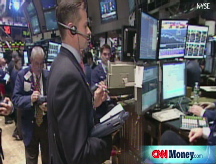Personal spending slides
Government report shows that individual spending fell more than expected in September while personal incomes rose.
NEW YORK (CNNMoney.com) -- Personal spending declined at a faster than expected rate in September, falling to its lowest level in more than four years, according to government figures released Friday.
The Commerce Department said personal spending decreased by 0.3% in September after stagnating in August. The measure has not been this weak since June 2004, when it fell 0.4%.
Economists had forecast a 0.2% decline in personal spending, according to a survey by Briefing.com.
Personal income, meanwhile, rose 0.2% in September after rising 0.4% in August. The Commerce Department said the decline from the previous month was due to the impact of Hurricane Ike on the Gulf Coast region.
Still, incomes grew faster than the 0.1% increase that economists were predicting.
Personal savings as a percentage of disposable income was 1.3% in the month, up from 0.8% in August.
Friday's report was "a confirmation of the economic challenges we currently face," said Michael Strauss, chief economist at Connecticut-based financial research firm Commonfund. But he added that the numbers were "not surprising" considering Thursday's report on the nation's gross domestic product.
Government figures released Thursday showed third quarter GDP, the broadest measure of economic activity, shrank at an annual rate of 0.3%, after a 2.8% growth rate in the second quarter.
Consumer spending, which makes up more than 70% of GDP, declined at an annual rate of 3.1% in the quarter, according to Thursday's report. It was the first time consumer spending fell since 1991 and the largest drop since early 1980.
Many economists worry that weak consumer spending will result in a negative reading in fourth quarter GDP. Two consecutive quarters of declining GDP are one of the classic definitions of a recession, though economists differ on this point.
Personal spending is likely to decline in October, Strauss said. "On balance, a decline of about 2% in fourth quarter GDP appears to be reasonable," he added. ![]()


